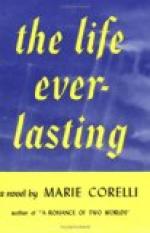“Does he consider himself immune from the common lot of mortals?” asked Dr. Brayle, with a touch of derision.
“He denies ‘the common lot’ altogether”—replied Mr. Harland—“For him, each individual life is a perpetual succession of progressive changes, and he holds that a change is never and can never be made till the person concerned has prepared the next ‘costume’ or mortal presentment of immortal being, according to voluntary choice and liking.”
“Then he is mad!” exclaimed Catherine. “He must be mad!”
I smiled.
“Then I am mad too,”—I said—“For I believe as he does. May I say good-night?”
And with that I left them, glad to be alone with myself and my heart’s secret rapture.
VII
MEMORIES
Perfect happiness is the soul’s acceptance of a sense of joy without question. And this is what I felt through all my being on that never-to-be-forgotten night. Just as a tree may be glad of the soft wind blowing its leaves, or a daisy in the grass may rejoice in the warmth of the sun to which it opens its golden heart without either being able to explain the delicious ecstasy, so I was the recipient of light and exquisite felicity which could have no explanation or analysis. I did not try to think,—it was enough for me simply to be. I realised, of course, that with the Harlands and their two paid attendants, the materialist Dr. Brayle, and the secretarial machine, Swinton, Rafel Santoris could have nothing in common,—and as I know, by daily experience, that not even the most trifling event happens without a predestined cause for its occurrence and a purpose in its result, I was sure that the reason for his coming into touch with us at all was to be found in connection, through some mysterious intuition, with myself. However, as I say, I did not think about it,—I was content to breathe the invigorating air of peace and serenity in which my spirit seemed to float on wings. I slept like a child who is only tired out with play and pleasure,—I woke like a child to whom the world is all new and brimful of beauty. That it was a sunny day seemed right and natural—clouds and rain could hardly have penetrated the brilliant atmosphere in which I lived and moved. It was an atmosphere of my own creating, of course, and therefore not liable to be disturbed by storms unless I chose. It is possible for every human being to live in the sunshine of the soul whatever may be the material surroundings of the body. The so-called ‘practical’ person would have said to me:—’Why are you happy?’ There is no real cause for this sudden elation. You think you have met someone who is in sympathy with your tastes, ideas and feelings,—but you may be quite wrong, and this bright wave of joy into which you are plunging heedlessly may fling you bruised and broken on a desolate shore for the remainder of your life. One would think you had fallen in love at first sight.




